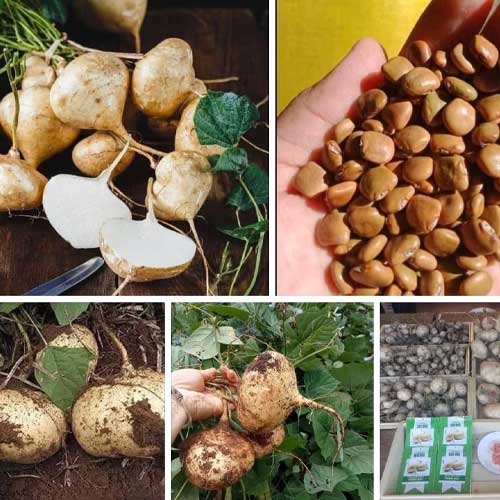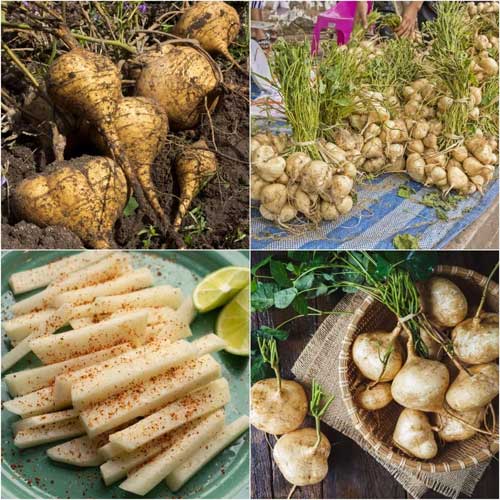Total Number of seeds: 20
Yam Bean Sankalu Seeds produce climbing legume vines that yield crisp, sweet, oval-shaped root tubers. The tubers are known for their juicy texture and mildly sweet flavor, making them a versatile addition to both savory and sweet dishes. Yam Bean, also known as Jicama or Sankalu, is commonly grown for its edible root tubers, which are enjoyed fresh, cooked, or even in salads. This variety is easy to grow and matures in 140-160 days after germination, providing a bountiful harvest of nutritious, water-rich roots. Yam Bean Sankalu is perfect for home gardeners looking to cultivate an exotic, crunchy vegetable that can be enjoyed in a variety of ways.


In India, Yam Bean Sankalu Seeds should be sown from February to April for best results. These plants thrive in warm, sunny conditions and produce sweet, juicy root tubers that are perfect for fresh use or cooking.
1. Apply Nutrient-Rich Fertilizers
When your plants begin flowering, use nutrient-rich fertilizers like Organic Bone Meal Powder or Vermicompost. This helps in boosting the bloom and enhances overall yield.
2. Use Organic Fertilizers
Feed your plants with organic fertilizers such as Cow Dung Manure or Neem Cake. Organic options promote healthy soil life.
3. Regular Feeding
Apply fertilizers every 20-25 days to ensure plants receive a steady supply of nutrients. Choose from various options like Cocopeat Compost for moisture retention.
Yam Bean Sankalu is known for its crisp, juicy root tubers that are rich in water and mildly sweet in flavor. This variety is versatile and can be enjoyed fresh in salads, sliced into stir-fries, or cooked into savory dishes. The climbing vines also add a decorative touch to the garden, making them a functional and attractive addition.
Yam Bean is rich in fiber, vitamin C, and antioxidants, making it a healthy addition to any diet. The tubers can be eaten raw, cooked, or added to salads for a crunchy, refreshing texture. They are also perfect for juicing, pickling, or adding to savory dishes.
When growing Yam Bean Sankalu Seeds, ensure the soil is loose and well-draining to support proper root development. Water regularly to keep the soil moist but avoid waterlogging. Monitor for pests and diseases to keep the plants healthy.
Common issues include pests like aphids and diseases like root rot. To prevent these problems, ensure good airflow and use organic pest control methods. Remove affected leaves to avoid disease spread.
Sign in now to receive a 5% instant discount on your first order when using code WELCOME. Begin your organic journey today!
By logging in, you're agreeing to our Terms of Service and Privacy Policy.
Anjana
The seedlings look clean and well shaped so far.
Deepa
Growth is neat and even; can’t wait to see the progress.
Chitra
Seedlings look firm and well rooted in the pot.
Raman
Seedlings came up green and structured, looking strong.
Lakshmi
Fresh leaves appearing daily; growth looks tidy.
Farid
Germination happened nicely in my tray, giving uniform seedlings.
Jithin
Sprouting was smooth and the small plants look balanced.
Rahul P
Healthy early-stage response from these seeds.
Govind
Clean germination with healthy early shoots forming.
Arun
These sankalu seeds germinated well and the early sprouts look healthy.